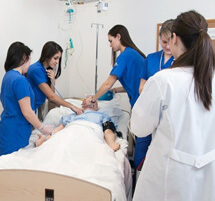What Types of Vaccines Will I Need as an LPN?

Working as a Licensed Practical Nurse, or LPN, you may be exposed to a variety of diseases, some of which can be quite serious. To reduce your chances of acquiring or spreading any such diseases, it is best to protect yourself with certain vaccines. Depending on your employer and regulations in your state, some of these vaccines may even be mandatory for employment in the healthcare field.
Hepatitis B
If you have not had a complete series of hepatitis B shots or do not have proof that you had the set of shots, you will need to begin a series prior to working as an LPN. This is a series of three intramuscular vaccines given over a time span of about six months. Approximately one or two months after receiving the final dose, you will be required to undergo testing to determine whether or not the vaccines were effective.
Influenza (flu shot)
Influenza vaccines are more commonly known as flu shots. These vaccines may or may not be required by your employer. However, even if they are not required, it is a wise idea to get one each year. In this way, you can be sure that you will be protected from acquiring or spreading the flu virus. These shots are given intramuscularly or nasally, and you only need to get one dose of the influenza vaccine each fall to maintain protection.
Tetanus Combination
Another shot that you may or may not need to get as a Licensed Practical Nurse is the tetanus combination vaccine. This is an intramuscular shot that includes vaccines for diphtheria and pertussis. Since all three of these diseases can make you quite ill, it is recommended for you to get this vaccine as soon as possible even if your employer does not require it. Boosters are usually only needed once every 10 years.
Measles Combination
The measles vaccine is another combination shot that offers protection against measles, rubella, and mumps. In most cases, this subcutaneous vaccine is not required for LPN employment, but it is highly recommended for healthcare workers. Many people born after 1957 have already had the required doses of the MMR vaccines. However, if you do not have your shot record and are not sure whether or not you had the required MMR vaccines, it is a good idea to get them as soon as possible.
Varicella (chickenpox and shingles)
If you had chickenpox as a child, if you never had a varicella vaccination, or do not have proof of getting one, it is recommended that you get a varicella vaccine. This is a shot that is given subcutaneously and protects against varicella (chickenpox) and herpes zoster (shingles). You will need two doses of this vaccine, which are typically given about four weeks apart.




